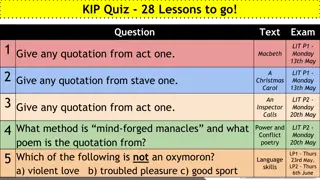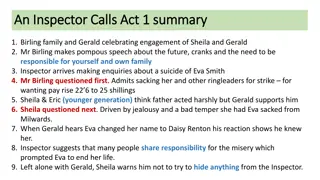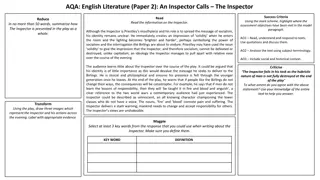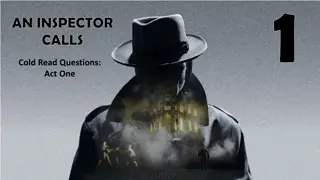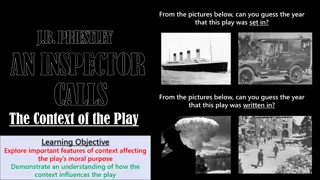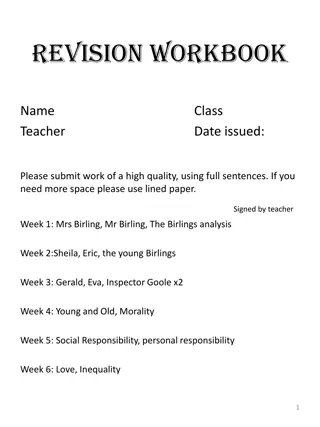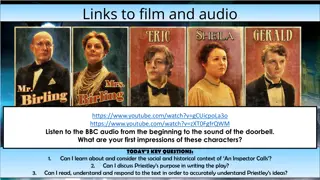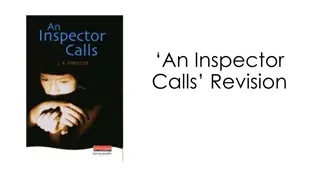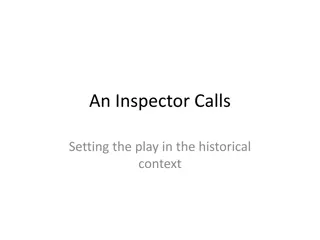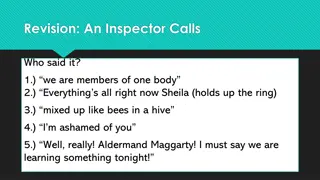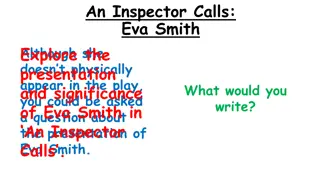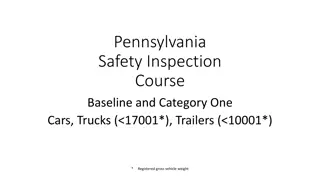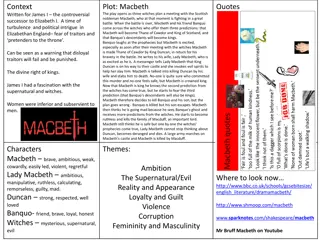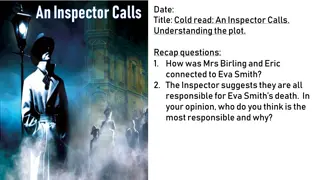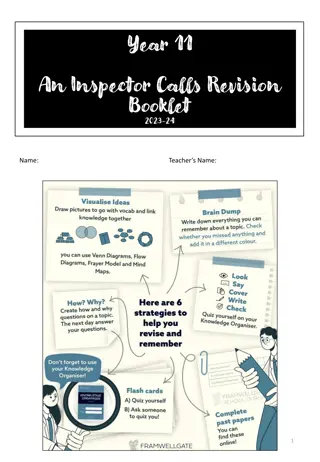Insights into "An Inspector Calls": Themes and Contexts
A detailed exploration of key quotes and themes from "An Inspector Calls" by J.B. Priestley, such as responsibility, class divides, and societal change. The analysis delves into characters' perspectives, societal norms of the Edwardian era, and the impact of significant events like World War I. The play's profound themes of socialism, capitalism, and gender roles are unpacked alongside the concept of time and dramatic irony employed by the author. Historical context and character dynamics are dissected to reveal the underlying messages of the play.
Download Presentation

Please find below an Image/Link to download the presentation.
The content on the website is provided AS IS for your information and personal use only. It may not be sold, licensed, or shared on other websites without obtaining consent from the author. Download presentation by click this link. If you encounter any issues during the download, it is possible that the publisher has removed the file from their server.
E N D
Presentation Transcript
Top 10 quotes 'we are members of one body' - Inspector Goole - Shows we are responsible for one another. The image of a body suggests our actions impact each other. 'community and all that nonsense' - reflects Mr Birlings Capitalist views. He believes we should worry about our business, ourselves and our family 'fire and blood and anguish' - Inspector Goole - Priestley is showing that the inequalities in society will be punished if people do not change. After 1912 there is a world war which links to the image of blood . 'you killed her - and the child she'd have had too' -Eric Birling blames his mother for the death of Eva through the pronoun you . Although he changes he does not accept his responsibility fully. 'girls of that class' - This is a Euphemism by Mrs Birling - she is judging Eva due to her class 'lower costs and higher prices' - Mr Birling does not care about people, only making a profit. 'but these girls aren't cheap labour - they're people' -Sheila Birling begins to stand up for those her father has mistreated. She becomes more confident and sympathetic as the play continues. 'So you admit you were prejudiced?'Inspector Goole questions Sybil Birling who says that she was prejudiced because Eva had been impertinent. It shows how the family judged others The younger generation are 'more impressionable' according to Goole and Priestley - they are the most likely to change. Society changed between 1912 and 1945 due to the young who had become adults 'I blame the young man who was the father of the child'Mrs Birling does not accept any responsibility and unknowingly blames Eric this builds tension as the audience becomes aware of his involvement before she does.
Top context The play is set in the Edwardian era 1912 and 1945 - The play is set in 1912, this is when the characters were alive but the play was watched in 1945 - so the audience knew what the future would bring for the characters War - After the play is set there is world war - this helped reduce inequalities as women gained more power and the classes fought side by side which reduced the distinctions between them. Priestley fought in the first world war. Women - At the time the play was set, women had fewer rights. They were subservient to men. Rich, middle class women were expected to get married. Poor women were used as cheap labour. Charities - As there was so little protection for people like Eva Smith, they were reliant on charities for help. Priestley wanted to create support for the welfare state , introduced in 1945, which led to the creation of the NHS, benefits for the unemployed etc. It meant that the vulnerable in society would be offered some protection. Time - Priestley was interested in theories of time. One influence on Priestley was a Russian philosopher, Ousepensky, who believed that time continued to repeat itself and that individuals must learn to stop repeating the same mistakes. Class - Your place in society was far more important in 1912 than it is today. Industrialists like Mr Birling made enough money to rise up the social ladder. His focus on social position explains why Mr Birling is so worried about creating a public scandal that may damage his reputation. Labour - The labour party supported working classes. Mr Birling talks about how we shouldn't listen to those cranks but in the UK general election of 1945 the Labour party won for the first time in British election history. Priestley voted for Labour. Socialism and Capitalism - Priestley was a socialist. Socialists believe that capitalists (such as Mr Birling) benefit the rich over the poor. Socialism is based on giving power and rights to the working class (such as Eva Smith, working in the factory). Titanic - Despite peoples belief that it was unsinkable the Titanic sank in 1912
Top methods Dramatic irony - This is where the audience knows something the characters do not. They know that Mr Billings speech is full of errors ( nobody wants war and the Titanic is unsinkable ) and this makes him appear foolish to them and discredits his capitalist views. Props and lighting - the lighting begins pink and intimate because the family are happy and celebrating. When the inspector arrives the light is brighter - he is interrogating them and revealing all their secrets and the lighting suggests they cannot hide. Interruptions - the use of interruptions allows different characters to battle for power. Mr and Mrs Birling interrupt their children but the inspector is able to interrupt the whole family as he takes command of the situation. Stage directions - these were used by Priestley to show how actors should look and speak. A stage direction such as angrily or cutting in massively allows the actors to show the audience the characters as Priestley wanted them to be seen. Entrances and exits - the timings of entrances and exits is important. The inspector rings the doorbell in the middle of a self-righteous speech by Mr Birling which interrupts him as Priestley wants this attitude to change. Eric arrives back from his walk just when it has been revealed he had got Eva pregnant and stolen money. Sheila leaves hysterically when she hears about Eva s job at Milliards which shows how much she is affected by her part in the chain of events.
Top themes Age - The older generation and the younger generation take the Inspector s message in different ways. The old, represented by Mr and Mrs Birling, are set in their ways. In contrast, Priestley uses the younger generation to represent hope for change to the 1945 audience. Gender - women are seen as inferior to men, Sheila is suspicious of Geralds indiscretions but is still engaged to him, she is instructed by her parents and Sybil even answers on her behalf. As the play progresses, Priestley shows that Sheila begins to fight for equality refusing to go to bed, standing up to her father, refusing the ring Gerald offers. In this way, the 1945 audience may have recognised that Sheila represented hope for gender equality in the future. Responsibility - Many of the characters have a narrow view of what it means to be responsible, but the Inspector provides a stronger message about social responsibility. His final speech is aimed not only at the characters but at the audience too. Class - The upper classes were ignorant of those beneath them and felt they were superior. They judged the working classes and Mr and Mrs Birling strive to increase their status and impress the Croft family. They feel that they are beyond question because of their class and try to intimidate the inspector. Social equality - The Inspector champions the cause of the poor and tries to get others to accept that all people share a common humanity and are part of a community. The Inspector is a spokesperson for the disadvantaged and a voice for the conscience which the Birlings and Gerald seem to lack. Love - The play presents many different interpretations of love. Sheila and Gerald appear to be in love at first. Both Eric and Gerald sleep with Eva, but neither of them seem to love her showing how working class women were vulnerable to being exploited by richer men. Mr Birling sees marriage as a way of progressing up the social and economic ladder.
Top structure and form Morality play - Morality plays were popular during the 15th and 16th-centuries. Historically they sought to teach the audience lessons that focused on the seven deadly sins: lust, gluttony, greed, sloth, wrath, envy and pride. Whilst characters who committed these sins were punished, morality plays showed that if a character repented then they could redeem themselves. A well made play - A well-made play is a popular dramatic genre from the 19th-century. In a well-made play the plot is intricate and complex and the action builds to a climax. This is often concerned with events that happened before the events of the play. A well-made play usually ends with a return to order but Priestley moves away from this genre with the revelation at the end. Crime thriller - A crime thriller is a genre that tells a gripping tale based around a crime. The audience receives clues on who has committed the crime and will enjoy trying to guess what happened before the end of the action. Cliffhangers - The play has three acts - each one ends with a cliffhanger which builds tension and engages the audience over the intervals (The inspector asking Gerald about Daisy, Eric returning when the audience has just found out he was the father of Evas unborn child, the phone ringing and an inspector is on his way) Speeches - as a play the length of speeches is a method used by Priestley. Mr Birling gives long speeches because he thinks he is knowledgable and has a lot to say. The inspector uses much shorter speech as he does not need lots of words to take command and do his duty. His final speech is longer showing its importance.




